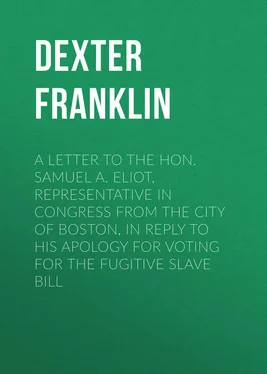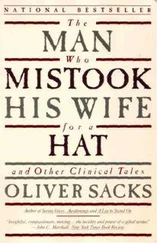Franklin Dexter - A Letter to the Hon. Samuel A. Eliot, Representative in Congress From the City of Boston, In Reply to His Apology For Voting For the Fugitive Slave Bill
Здесь есть возможность читать онлайн «Franklin Dexter - A Letter to the Hon. Samuel A. Eliot, Representative in Congress From the City of Boston, In Reply to His Apology For Voting For the Fugitive Slave Bill» — ознакомительный отрывок электронной книги совершенно бесплатно, а после прочтения отрывка купить полную версию. В некоторых случаях можно слушать аудио, скачать через торрент в формате fb2 и присутствует краткое содержание. Жанр: foreign_antique, foreign_prose, на английском языке. Описание произведения, (предисловие) а так же отзывы посетителей доступны на портале библиотеки ЛибКат.
- Название:A Letter to the Hon. Samuel A. Eliot, Representative in Congress From the City of Boston, In Reply to His Apology For Voting For the Fugitive Slave Bill
- Автор:
- Жанр:
- Год:неизвестен
- ISBN:нет данных
- Рейтинг книги:5 / 5. Голосов: 1
-
Избранное:Добавить в избранное
- Отзывы:
-
Ваша оценка:
- 100
- 1
- 2
- 3
- 4
- 5
A Letter to the Hon. Samuel A. Eliot, Representative in Congress From the City of Boston, In Reply to His Apology For Voting For the Fugitive Slave Bill: краткое содержание, описание и аннотация
Предлагаем к чтению аннотацию, описание, краткое содержание или предисловие (зависит от того, что написал сам автор книги «A Letter to the Hon. Samuel A. Eliot, Representative in Congress From the City of Boston, In Reply to His Apology For Voting For the Fugitive Slave Bill»). Если вы не нашли необходимую информацию о книге — напишите в комментариях, мы постараемся отыскать её.
A Letter to the Hon. Samuel A. Eliot, Representative in Congress From the City of Boston, In Reply to His Apology For Voting For the Fugitive Slave Bill — читать онлайн ознакомительный отрывок
Ниже представлен текст книги, разбитый по страницам. Система сохранения места последней прочитанной страницы, позволяет с удобством читать онлайн бесплатно книгу «A Letter to the Hon. Samuel A. Eliot, Representative in Congress From the City of Boston, In Reply to His Apology For Voting For the Fugitive Slave Bill», без необходимости каждый раз заново искать на чём Вы остановились. Поставьте закладку, и сможете в любой момент перейти на страницу, на которой закончили чтение.
Интервал:
Закладка:
It would seem from your historical review, that the clause in the Constitution respecting fugitive slaves was the grand compromise between the North and the South, without which "the Constitution could not have been adopted"; and that to this clause we owe our glorious slave-catching Union. You fortify this wonderful historical discovery by appealing to the "deliberate declarations" of Southern members, that they "would not enter a union with States who would tempt away their slaves," &c. It is to be regretted that you have not deemed it expedient to refer to the records of these declarations, as other students of our constitutional history are wholly ignorant of them. Suffer me, Sir, to enter into a few historical details, for the purpose of vindicating the liberty I take to differ with you as to the accuracy of your statements.
The Convention met in Philadelphia, 25th May, 1787. On the 29th of the same month, Mr. Randolph, of Virginia, submitted a plan of government. It contained no allusion to fugitive slaves. On the same day, Mr. Charles Pinckney, of South Carolina, submitted another plan. This last provided for the surrender of fugitive criminals, but was silent about fugitive slaves. On the 15th of June, Mr. Patterson, of New Jersey, submitted a third plan. This also provided for the surrender of fugitives from justice, but not from bondage. On the 18th, Mr. Hamilton announced his plan, but the fugitive slave found no place in it. On the 26th of June, the Convention, having agreed on the general features of the proposed Constitution in the form of resolutions, referred them to "a committee of detail," for the purpose of reducing them to the form of a Constitution. In these resolutions, there was not the most distant allusion to fugitive slaves. On the 6th of August, the committee reported the draft of a Constitution, and yet, strange as you may deem it, the provision without which, you tell us, the Constitution could not have been adopted, was not in it, although there was in it a provision for the surrender of fugitive criminals. For three months had the Convention been in session, and not one syllable had been uttered about fugitive slaves. At last, on the 29th of August, as we learn from the minutes, "It was moved and seconded to agree to the following proposition, to be inserted after the 15th article: 'If any person, bound to service or labor in any of the United States, shall escape into another State, he or she shall not be discharged from such service or labor in consequence of any regulation subsisting in the State to which they escape, but shall be delivered up to the person justly claiming their service or labor,' which passed unanimously ." Really, Sir, I find in this record but little evidence of the perplexity which distressed our wise men, or of the great compromise between the North and South, on which you dwell. The 15th article, referred to above, was the article providing for the surrender of fugitives from justice, and this suggested the idea, that it would be well to provide, also, for the surrender of fugitive slaves. In an assembly consisting almost exclusively of slaveholders, the idea was exceedingly relished; and without a word of opposition, the suggestion was unanimously adopted. From Mr. Madison's report we learn that, the day before, Messrs. Butler and Pinckney had informally proposed that fugitive slaves and servants should be delivered up "like criminals." "Mr. Wilson [of Penn.]. This would oblige the Executive of the State to do it at the public expense. Mr. Sherman [of Conn.] saw no more propriety in the public seizing and surrendering a slave or servant than a horse." ( Madison Papers , p. 1447.) The subject was here dropped. The next day the motion was made in form, and, as Mr. Madison says, "agreed to, nem. con. " From the phraseology of the motion, and the objections of Messrs. Wilson and Sherman, it was perfectly understood that the obligation of delivery was imposed on the States, and that no power was intended to be conferred on Congress to legislate on the subject. Messrs. Wilson and Sherman's objections arose from no moral repugnance to slave-catching, but from the inconvenience they apprehended the State authorities would be subjected to; and Mr. Wilson perhaps spoke from experience, as his own State had at that very time a law for catching and returning fugitive slaves from other States. The idea, therefore, that this agreement was a compromise between the North and South is wholly imaginary, and you, Sir, must have mistaken some recent fulminations from the Southern chivalry for the "deliberate declarations" which you suppose were made in the Convention. Believe me, Sir, no members of the Convention ever declared they would not enter into the Union, unless it was agreed to surrender fugitive slaves, for the obvious reason, that the Northern slaveholders required no threats from their Southern brethren to consent to a compact convenient to both. It is very true, Sir, that there were compromises, and that there were "deliberate declarations," but they had no reference to the surrender of runaway slaves. I have pointed out your historical mistake, not because it has the remotest bearing on your justification, but because you seem to think that it has.
The first great compromise was between, not the North and the South, but the small and the large States. The one claimed, and the other refused, an equality of suffrage in the national legislature. It was at last agreed, that the suffrage should be equal in one house, and according to population in the other. This was the first compromise. Then came the question, What should constitute the representative population? The Southern States had more slaves than the Northern, and the former insisted that slaves should be included in the representative population. This would have given the Southern States an unfair preponderance in Congress. Moreover, a portion of the Southern States were engaged in the African slave-trade, and, of course, every slave landed on their shores would increase their political power in Congress. To reconcile the North to slave representation, it was offered that direct taxation should be proportioned to representation. But the North was reluctant, and, as usual, was bullied into a compromise. Mr. Davie, of North Carolina, made a "deliberate declaration": – "He was sure that North Carolina would never confederate on any terms that did not rate them (the slaves) at least as three fifths. If the Eastern States meant, therefore, to exclude them (the slaves) altogether, the business was at an end." ( Madison Papers , p. 1081.) This threat, and others like it, settled the matter. The compromise, of three fifths of the slaves to be included in the representative population, was accepted on the motion of a New England member ; and the consequence is, that the slave States have now twenty-one members in the lower house of Congress more than they are entitled to by their free population. This was the second compromise. There was still a third, far more wicked and detestable, and effected by the "deliberate declarations" of Southern members. The "committee of detail" has been already mentioned. It consisted of Messrs. Rutledge of South Carolina, Randolph of Virginia, Wilson of Pennsylvania, Ellsworth of Connecticut, and Gorham of Massachusetts. This committee, it will be recollected, were to reduce to the form of a Constitution the resolutions agreed on by the Convention. Neither in the resolutions themselves, nor in the discussions which preceded their adoption, had any reference been made to a guarantee for the continuance of the African slave-trade. Nevertheless, this committee, of their own will and pleasure, inserted in their draft the following clause: – "No tax or duty shall be laid by the legislature on articles exported from any State, nor on the migration or importation of such persons as the several States shall think proper to admit, nor shall such migration or importation be prohibited ." To understand the cunning wickedness of this clause, it must be recollected that Congress was to have power to regulate foreign commerce, and commerce between the States; and hence it might, at a future time, suppress both the foreign and domestic commerce in human flesh, or it might burden this commerce with duties. Hence this artfully expressed perpetual restriction on the power of Congress to interfere with the traffic in human beings. As this grand scheme was concocted in the committee, and not in the Convention, it may be interesting to inquire into its paternity.
Читать дальшеИнтервал:
Закладка:
Похожие книги на «A Letter to the Hon. Samuel A. Eliot, Representative in Congress From the City of Boston, In Reply to His Apology For Voting For the Fugitive Slave Bill»
Представляем Вашему вниманию похожие книги на «A Letter to the Hon. Samuel A. Eliot, Representative in Congress From the City of Boston, In Reply to His Apology For Voting For the Fugitive Slave Bill» списком для выбора. Мы отобрали схожую по названию и смыслу литературу в надежде предоставить читателям больше вариантов отыскать новые, интересные, ещё непрочитанные произведения.
Обсуждение, отзывы о книге «A Letter to the Hon. Samuel A. Eliot, Representative in Congress From the City of Boston, In Reply to His Apology For Voting For the Fugitive Slave Bill» и просто собственные мнения читателей. Оставьте ваши комментарии, напишите, что Вы думаете о произведении, его смысле или главных героях. Укажите что конкретно понравилось, а что нет, и почему Вы так считаете.











